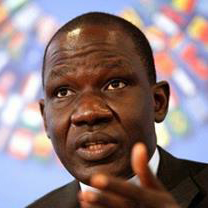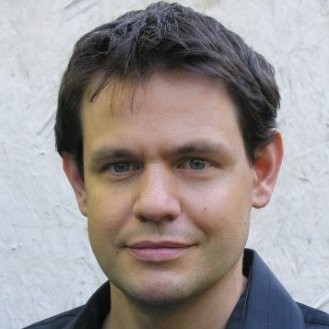
Event Recap
An economic “paradigm shift” is officially underway in Cameroon, said Alamine Ousmane Mey, the country’s minister of economy, planning, and regional development.
Speaking at an event hosted by the Africa Center and the Geoeconomics Center—as part of the Atlantic Council’s IMF and World Bank Spring Meetings dialogue series—Ousmane Mey explained that Cameroon is looking to “reengineer [its] production capacity” so that the country can “produce more locally” to not only satisfy “national demand,” but also boost Cameroon’s exports. The minister also spoke about his country’s economic trajectory, opportunities for collaborating with the United States, and ways to reform the Bretton Woods institutions.
Below are highlights from the conversation, which was moderated by Julian Pecquet, the Washington/UN correspondent for Jeune Afrique and the Africa Report. Rama Yade, senior director of the Africa Center, provided welcoming remarks.
Cameroon’s economic outlook
- Despite the global challenges of inflation, the minister said he believes Cameroon’s economy “has been very resilient.” In 2020, the growth rate was at “3.5 percent,” and despite that growth slowing during the pandemic, the country is projected to bounce back to a “4.3 percent growth rate in 2023.” Although this trend is promising, the minister admitted that it is “not enough for [Cameroon] to get to [its] goal of becoming an emerging economy by 2035.”
- The economic stressors of the past few years have led to structural changes in Cameroon. “A paradigm shift… is taking place,” argued the minister, “to reengineer production capacity to be able to produce more locally to cover the national demand and export more.” At the same time, the government is prioritizing reforms, Ousmane Mey said, to make the environment more attractive to foreign investors in the industrial sector, which the minister argued “will lead to job creation and reinforce [Cameroon’s] resilience to future shocks.”
Partnership with the United States
- US government funding for certain security initiatives and projects has been “commendable,” he said. However, Ousmane Mey said that other sectors are still lacking support, as the US needs “to accelerate on the delivery in terms of funding the green transformation” and creating a favorable investment climate for the US private sector.
- The minister praised the decision by US President Joe Biden to create the President’s Advisory Council on African Diaspora Engagement in the United States. He said that this will allow the United States to positively “take advantage of the diaspora,” he said, which is available to “invest,” “give back,” and “really contribute to the development of the continent.”
- On the subject of regaining African Growth and Opportunity Act benefits, the minister said he views such an outcome as a “win-win solution” for the US economy and for Cameroon, and noted that negotiators are “working in a very transparent, open manner” to be able to iron out any remaining issues. As to the current status of the discussions, the minister described them as “ongoing.”
Bretton Woods reforms
- On reforming the Bretton Woods system, the minister said that the Group of Twenty Common Framework for debt treatment has been “a good initiative”. “This is certainly one thing we should include in the reform of the financial institutions in the future” to improve crisis responses, he said.
- In the World Bank, Cameroon is pursuing “two twin goals”: “ending extreme poverty as well as promoting shared prosperity,” the minister explained, adding that climate change, in particular, is at the core of these issues. He argued that international monetary institutions must address climate change with a focus on “resiliency,” “inclusion,” and “sustainability.”
Alexandra Gorman is a young global professional at the Atlantic Council’s Africa Center.
Event Preview
As part of its annual dialogue series—held each year during the IMF and World Bank Spring Meetings—the Africa Center, in cooperation with the GeoEconomics Center, is hosting Cameroon’s Minister of Economy, Planning, and Regional Development, Alamine Ousmane Mey on Monday, April 10 at 9:30 a.m. EST | 2:30 p.m. GMT
This moderated discussion will focus on the country’s economic environment, covering everything from its rebound from the COVID-19 pandemic, the enduring consequences of the Ukraine war, as well as regional challenges and efforts to stabilize against global inflation. The minister’s stay in Washington also offers an opportunity to discuss US-Cameroon bilateral relations and the impact of the recent US-Africa Leaders Summit.
Register here, and you will receive information on how to join the event. You may also watch it at the above YouTube link.
This event is part of the Atlantic Council’s IMF-World Bank Spring Meetings event series that convenes Finance Ministers and Central Bank Governors from around the world to discuss the challenges and opportunities facing the global economy in 2023. Learn more about our programming during the week here and our Bretton Woods 2.0 Project.
Featuring

H.E. Alamine Ousmane Mey
Minister of Economy, Planning, and Regional Development
Republic of Cameroon
Read Minister Alamine Ousmane Mey’s bio

Julian Pecquet
Washington/UN correspondent
Africa Report
Welcoming remarks

The Africa Center works to promote dynamic geopolitical partnerships with African states and to redirect US and European policy priorities toward strengthening security and bolstering economic growth and prosperity on the continent.

At the intersection of economics, finance, and foreign policy, the GeoEconomics Center is a translation hub with the goal of helping shape a better global economic future.

Follow the conversation on Twitter with @ACGeoEcon and @ACAfricaCenter using #FutureofEcon